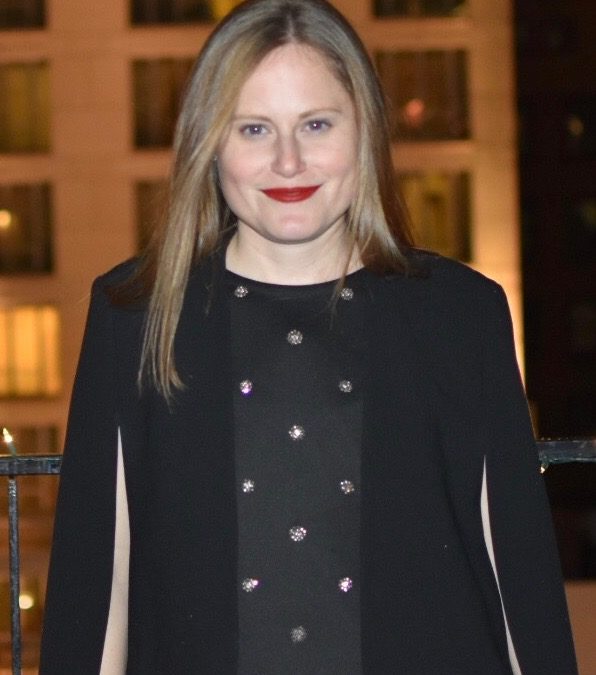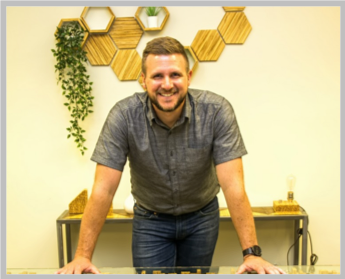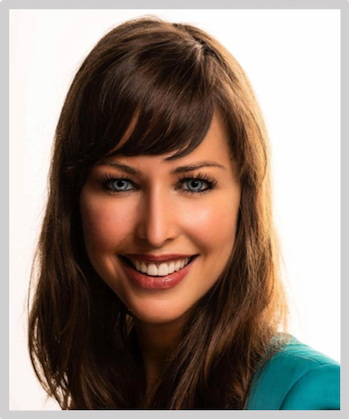NEXUS Member Spotlight
We were lucky to sit down with Maggie Kervick, Director of Strategy and Integrated Partnerships at GCNYC Fair Fashion Center. Previously Maggie served as the NEXUS founding co-chair for the Ethical Fashion Lab where she spearheaded high-level discussions, collaborations and panels and helped bring ethical fashion out of the shadows as an impact topic and onto the NEXUS agenda. What better time to hear from Maggie on the future of fashion then the middle of fashion week!
NEXUS is all about learning people’s passions, so what keeps you up at night?
 The integrated issues facing business and the world keeps me up at night. I often lie awake thinking about how business could be used as an instrument of change. I am keenly focused on how adjustments to everyday business practices can create (or reduce) impacts. I truly believe that using the economic engines of business can help to tackle global issues. Businesses just need to be properly facilitated with solutions that align with their disciplines and their balance sheets.
The integrated issues facing business and the world keeps me up at night. I often lie awake thinking about how business could be used as an instrument of change. I am keenly focused on how adjustments to everyday business practices can create (or reduce) impacts. I truly believe that using the economic engines of business can help to tackle global issues. Businesses just need to be properly facilitated with solutions that align with their disciplines and their balance sheets.
How did you get your start in the fashion? You made bags in high school?
My interest in fashion began with the (accidental) founding of my handbag company Bags By Mags. What started as a hobby of crafting handbags for friends, turned into a full-fledged business that included bespoke products and pop up shops.
During my junior year of college at the Fashion Institute of Technology, we had a project that challenged us to create bags out of non-traditional materials. As a resident assistant with tons of condoms at my disposal, I decided to craft handbags out of the wrappers. The excitement created by the original samples led me to a partnership with Lifestyles®. In 2011 a capsule collection of handbags, made from Lifestyles® SKYN® condom wrappers, launched with the mission to ‘put stigma to bed’ and empower women to carry and use condoms.
It was incredibly important to me that the project stood for more than just a fashion item. I decided to align with Lifestyles® because of their long history and commitment to engaging women in sexual health. To maximize the impact of the very provocative styles, each bag had a condom pocket, included a gift from Lifestyles® of a pack of condoms and a portion of proceeds were donated to health education. The handbags were featured on Racked and Refinery29 and were taken in as part of the permanent collection at the Museum of Sex.
Through the project with Lifestyles®, I was hired as a designer at Kenneth Cole. As the Chairman of amfAR, the largest HIV/AIDS research organization globally, Kenneth has been a pioneer in raising awareness around sexual health and infectious disease.
Shortly after joining the team as a designer, Kenneth sat me down to discuss my passions and professional development. Under his mentorship, he transformed my career trajectory by transitioning me into corporate sustainability role. He recognized my unique ability to create business models that connected business and society. While I will always have a passion for design, I am forever grateful of Kenneth’s guidance because it has allowed for a career that has far exceeded my wildest dreams.
 GCU is the first foreign university in the US to receive degree granting authority! Congrats on achieving that honor. What is it about GCU’s mission that has so resonated?
GCU is the first foreign university in the US to receive degree granting authority! Congrats on achieving that honor. What is it about GCU’s mission that has so resonated?
Thank you, it is a very exciting milestone becoming the first international institution in the United States to receive degree granting authority to offer degrees!
Glasgow Caledonian University is a 142-year old institution with a mission “For the Common Good”. With a presence in Glasgow, London, Bangladesh, South Africa and Mauritius, the University is globally networked and uses a research-based approach to up-skilling the next generation of leaders.
Leveraging a rich history and commitment to people, planet and profits, the University takes a pragmatic approach developing students to become experts in their sector, while also having the understanding of how to operate as truly globally minded corporate statesmen. GCU’s commitment to transforming lives through education is the core tenant that has allowed the University to work in communities around the world.
In particular in New York, the Fair Fashion Center was established, which is working with the apparel and accessories industry on the incorporation of more sustainable business practices – by proving the business case for sustainability and turning global issues into industry opportunities. The Center’s effectiveness in bridging the knowledge of the public sector with solutions that can be integrated with the private sector has resonated strongly and has helped to shape our academic offerings here in New York.
 What drew you to NEXUS? What has NEXUS meant to you?
What drew you to NEXUS? What has NEXUS meant to you?
I was connected to Nexus through a dear friend. Nexus has been a powerful forum to meet like-minded people passionate about building a healthier world. While Nexus has certainly introduced me to individuals and organizations to connect with professionally, it has more importantly connected me to people who have become lifelong friends and advisors.
As the chair of the NEXUS ethical fashion lab, how do you think the NEXUS community can make an impact in creating change in the industry?
The power of the Nexus community is the convergence of investors, social entrepreneurs, NGOs and philanthropists around a common goal to accelerate global solutions. The collision of global perspectives allows for creative exploration that often times leads to new businesses or initiatives that have far greater impact. The Nexus community can help the industry in a number of ways whether its leveraging on the ground experience combatting climate change or labor issues, advising on innovative business models from other industry’s that can support fashion, and beyond.
What are some cool brands or initiatives related to sustainable fashion that are being led by NEXUS members?
There are a number of interesting brands and initiatives being led by Nexus members. Olivia Rose Wright is providing uniforms to school girls in Africa through the sale of her ready to wear dress line, Ariela Suster is providing economic opportunity ex-gang members in El Salvador through her accessories line at Sequence Collection, Angela Luna is designing clothes that also serve as shelter for refugees with her collection Adiff, David Dietz created the go-to sustainability shopping destination with Modavanti.com, and of the list goes on and on.
 As the head of strategy for GCNYC and the fair fashion center, what are your big goals for the upcoming year?
As the head of strategy for GCNYC and the fair fashion center, what are your big goals for the upcoming year?
GCNYC is welcoming its first cohort of graduate students, as we recently became the very first foreign university to be given degree-granting authority in the U.S. It will be a unique group of students, educated in the ways of our industry through a lens of sustainability – learning the mechanisms that drive our business, redesigned to be successful while supporting our planet and its people. We are really excited to be offering students a truly unique experience that combines traditional academic rigor with direct engagement with industry and global sustainability experts.
Museum of Modern Art invited the Fair Fashion Center to join their upcoming exhibition “ITEMS: Is Fashion Modern?”, which is on display this Fall/Winter from October to January. Working in collaboration with famed artist, Giorgia Lupi, the MOMA has visualized our work – what we now refer to as the Quantum Redesign of Fashion. Turning our research into visual art, the focal point of the show outlines how changes to the sub-businesses of fashion can deliver on the United Nations Sustainable Development Goals. The visualization of our data demonstrates the interconnectivity of all that makes our industry a prime example for a respectful and regenerative future.
Additionally, the Fair Fashion Center is continuing to build upon a number of initiatives and I’m leading new research in a few key areas that include efficiencies in the built environment, carbon offsetting, circular solutions, and organic cotton.
When you look at the sustainable fashion movement as a whole, what are the innovations that excite you most?
I often get most excited by activities happening in other industries that can be applied to tackle challenges in fashion’s value chain. When considering the influence the fashion supply chain has on other industries – from farming and manufacturing to transportation, real estate and waste management—there are opportunities in the sub businesses that can help the fashion reduce its impacts and create a respectful and regenerative ecosystem that supports people, planet and profits. Our work at the Fair Fashion Center is occupying the in-between space between science/NGOs and the industry to help companies move beyond CSR and integrate sustainability across all business units.
As an example, we exploring how to influence regenerative agriculture practices down the supply chain. I’m excited to see how block chains and other technologies will enable a more transparent chain of custody to be able to more confidently make claims and certify products. It is also fascinating to see different solutions that are leveraging big data to do predictive analysis and modeling.






Recent Comments